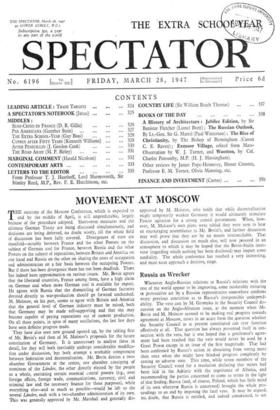MOVEMENT AT MOSCOW
THE outcome of the Moscow Conference, which is expected to end by the middle of April, is still unpredictable, largely because of the procedure adopted. Short-term measures and the ultimate German Treaty are being discussed simultaneously, and decisions are being deferred, no doubt wisely, till the whole field of discussion has been fully covered. Divergences of view are manifold—notably between France and the other Powers on the subject of German coal for France, between Russia and the other Powers on the subject of reparations, between Britain and America on one hand and Russia on the other on sharing the costs of occupation and administration on a fair basis between the occupying Powers. But if there has been divergence there has not been deadlock. There has indeed been approximation on various issues. Mr. Bevin agrees that the liberated countries, France among them, have a high claim on German coal when more German coal is available for export. He agrees with Russia that the dismantling of German factories devoted directly to war-production should go forward unchecked. M. Molotov, on his part, seems to agree with Britain and America that the general level of German industry must be raised, both that Germany may be made self-supporting and that she may become capable of paying reparations out of current production. On all these points, in spite of many oscillations, the last few days have seen definite progress made.
They have also seen new ground opened up, by the tabling first of Mr. Bevin's and then of M. Molotov's proposals for the future constitution of Germany. It is unnecessary to analyse these in detail, for they will both inevitably undergo considerable modifica- tion under discussion, but both attempt a workable compromise between federation and decentralisation. Mr. Bevin desires a two- chamber Government at the centre, one chamber consisting of nominees of the Lander, the other directly elected by the people as a whole, exercising certain essential central powers (e.g., over foreign affairs, foreign trade, communications, currency, civil and criminal law and the necessary finance for these purposes), while everything else—and as much as possible—would be left to the several Lander, each with a two-chamber administration of its own. This was generally approved by Mr. Marshall and generally dis-
approved by M. Molotov, who holds that while decentralisation might temporarily weaken Germany it would ultimately stimulate Fascist agitation for a strong central government. When, how- ever, M. Molotov's own plans were tabled they were seen to bear an encouraging resemblance to Mr. Bevin's, and further discussion may well prove that they are by no means irreconcilable. That discussion, and discussion on much else, will now proceed in an atmosphere to which it may be hoped that the Bevin-Stalin inter- view (regarding which nothing has been disclosed) may impart some cordiality. The whole conference has reached a very interesting, and must -soon approach a decisive, stage.


































